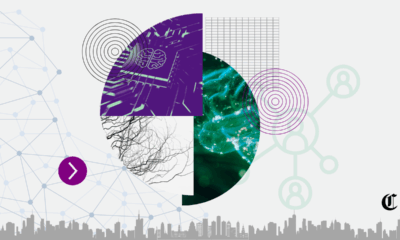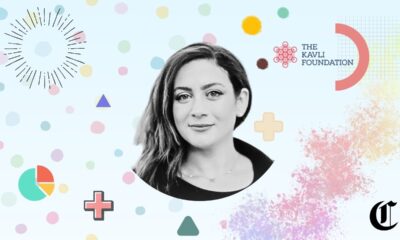Stories in Science Special Series
How Studying the Brain Transformed my Brain
Lori Saxena: “I began to understand that I didn’t love neuroscience because of the medals and acclaim it gave me, but because of its universality. Because it can be studied and tested and corrected—an ever-expanding, ever-improving existential philosophy.”

Lori Saxena
[su_boxbox title=”About”]Lori Saxena is currently a high school junior in New York, and is the president of the Westchester chapter of the IYNA. A competitor at the USA National Brain Bee in 2019, a member of the organization SimplyNeuroscience, and a student who has been actively involved in scientific research since her sophomore year in high school, she has a large interest in neuroscience and STEM in general. She also loves to read and write, and when she isn’t doing homework or reading yet another neurology textbook, you can find her listening to some Indie Pop while reading a good book. Connect with her via Linkedin. [/su_boxbox]
[su_boxnote note_color=”#c8c8c8″]Key Points:
- Find something you are passionate about and pursue it as far as you can, it will not only help you become a better version of yourself but it will also grant you a feeling of accomplishment.
- Do something because you love to do it, not because you’re good at it. When you genuinely enjoy something, you will find it much more rewarding than any other activity you could invest your time in.[/su_boxnote]
[dropcap]S[/dropcap]cience Olympiad was the first club I shuffled into as a dopey freshman high school student. The meeting began at 7:45AM. Like most of the kids there, I had a perfect A+ in my middle school science classes. It was something I was good at, something I understood, but not necessarily something I loved.

Lori Saxena
As teams were formed and students were assigned topics in which they would compete, I found myself remarkably uninvolved. I couldn’t care less if I was to be identifying the different kinds of reptiles, naming and organizing rocks and minerals, or building a Rube Goldberg machine. I just wanted to do something, it didn’t matter what it was.
In response to my complete and utter lack of concern, the officers of the club assigned me to the topic of Anatomy and Physiology. For that year’s competition, I was to learn and study the nervous system, and having been given a topic, I began to explore this area with little concern about the actual subject. All I sought was a shiny medal, something to brag about to my friends and keep on display in my room.
To reach my goal, I began to read a textbook which covered the topics of visual perception, ocular dominance columns, and the idea that brain structure and function were intertwined, and for me this was a revelation.
The textbook outlined a completely novel way of thinking: the notion that between my ears, behind my forehead and nose was a collection of cells, of neurons, an organ responsible for how I saw and perceived the world.
I was, and still am, very young and this was without question the greatest catharsis I had ever experienced. Here wasn’t simply a foundation for my behavior, but for others’ as well. My lack of interest in the subject faded as I began to learn why I was me.
In response, I worked hard.
I bought a twenty-pack of colored Staedtler Triplus Fineliners to sketch and learn neural pathways in the brain and spinal cord. I guzzled gallons of Diet Coke (I didn’t drink “hard” caffeine at the time) to wage war on the complexities of the human nervous system. But after I failed to medal at the Science Olympiad competition in February 2018, my resolve to pursue the subject wavered. My tenacity extended only so far.
However, despite my failure, I found myself being drawn back to the subject of the human brain. I can remember walking down the hallways in school, observing my peers and teachers, and for every action I observed, every comment I heard, and everything I witnessed, I always wondered “Why?” Why do we act the way we do? Why do we think the way we do? I kept thinking back to my brief study of the nervous system, wondering if it held the answers.
In response to my constant curiosity, I began to once again self-study neuroscience. I learned that strokes in particular brain regions shattered personalities and could leave you speechless or unable to read. That a tumor in your amygdala could cause insatiable desires.
Such evidence convinced me that to understand behavior—how and why we do what we do—I needed to understand the brain, how it develops and forms, how it functions and dysfunctions.
I spent countless, excruciating hours memorizing all the cranial nerves and their functions. I poured over textbooks detailing each neurotransmitter known to man. I wouldn’t rest until I learned how to decipher MRI scans and knew about almost every neurological disorder which could possibly afflict a person. All with the goal of studying and one day understanding the living human brain.
As I entered into my sophomore year, my passion and zeal for neuroscience only grew. And when I earned 12th place at the USA National Brain Bee Competition and finally won the medal that I had so wanted so badly as a freshman, I was struck by the realization that it didn’t matter to me as much as I thought it did. I didn’t care about the medal, the certificate, or the shiny trophy. I had learned, partially due to my obsession with the nervous system, that life was short and fragile, and that a medal I earned in high school wasn’t enough to sustain me. I wanted to learn about something, become so engrossed in a topic that it was all I could see, all I could think about, and I realized that neuroscience had given that to me.
I began to understand that I didn’t love neuroscience because of the medals and acclaim it gave me, but because of its universality. Because it can be studied and tested and corrected—an ever-expanding, ever-improving existential philosophy. It is as much a tool to diagnose and treat as it is to tolerate and love.
The years that I self-studied the human nervous system, and the years where I will continue to do so, have sculpted the way I think, and have, quite literally, sculpted my brain.
It is this passion, this lust for knowledge, that has encouraged me in various aspects.
I am no longer the laid-back, uncaring freshman that I once was. I have a passion, a purpose, something I plan on pursuing. I found a love for neuroscience, and despite the obscurity surrounding the subject and the baffling secrets of the human brain, this passion has persisted despite both setbacks and successes. And despite my only being a high school junior, I have found one thing which I can say I’m not only good at, something I not only understand, but something I love.
I have learned that to be consumed entirely by a subject and to devote yourself to learning about it, grants a feeling that can’t be achieved by anything else. I have learned that it’s far better to care deeply about one thing than to simply be good at it, and that a passion for something in life is what encourages people to push harder, run faster, and become stronger. I found my passion, and even if this passion of mine changes, I know what it’s like to care about something to the point where I go one step further than I’m required to go.
I no longer need to wait for someone to point me in the right direction to achieve a certain goal. I don’t need to wait for the officers of my school’s Science Olympiad club to tell me what to pursue or study. Instead, I find the direction myself in a way that’s exciting for me, and I work hard to pursue whatever path I have chosen.
It is this passion, this lust for knowledge, that has encouraged me in various aspects. It is what led me to conduct neurological research the summer before my junior year. It is what encouraged me to start a neuroscience club in my school. It is what led me to become involved in an organization that works to teach and engage students in neuroscience. None of these activities come with any quantifiable awards. I have received no shiny medals, no large trophies, but I am warmed by the fact that I am able to make an impact in a field that I love. I don’t need validation to pursue my passion, but I have the drive and the will to pursue it without validation.
My study of the nervous system has taught me all this, and even if I don’t pursue neuroscience in the future, it has enabled me to feel passionate, to understand what it’s like to love something, and it has taught me that when I love a subject, no matter how many competitions I may win or lose, that I will continue to love and embrace it. It is that feeling, that burning desire to stick with something, rain or shine, that has become something I’m addicted to, one I strive for, and one I love.
Cover image by ElisaRiva from Pixabay.
Metrics
Sessions
Total number of Sessions. A session is the period time a user is actively engaged with the page.
Visitors
Users that have had at least one session within the selected date range. Includes both new and returning users.
Page views
Pageviews is the total number of time the article was viewed. Repeated views are counted.
The CS Media Lab is a Boston-anchored civic science news collective with local, national and global coverage on TV, digital print, and radio through CivicSciTV, CivicSciTimes, and CivicSciRadio. Programs include Questions of the Day, Changemakers, QuickTake, Consider This Next, Stories in Science, Sai Resident Collective and more.

-
 Audio Studio1 month ago
Audio Studio1 month ago“Reading it opened up a whole new world.” Kim Steele on building her company ‘Documentaries Don’t Work’
-
Civic Science Observer1 week ago
‘Science policy’ Google searches spiked in 2025. What does that mean?
-
Civic Science Observer1 month ago
Our developing civic science photojournalism experiment: Photos from 2025
-
Civic Science Observer1 month ago
Together again: Day 1 of the 2025 ASTC conference in black and white
Contact
Menu
Designed with WordPress
























